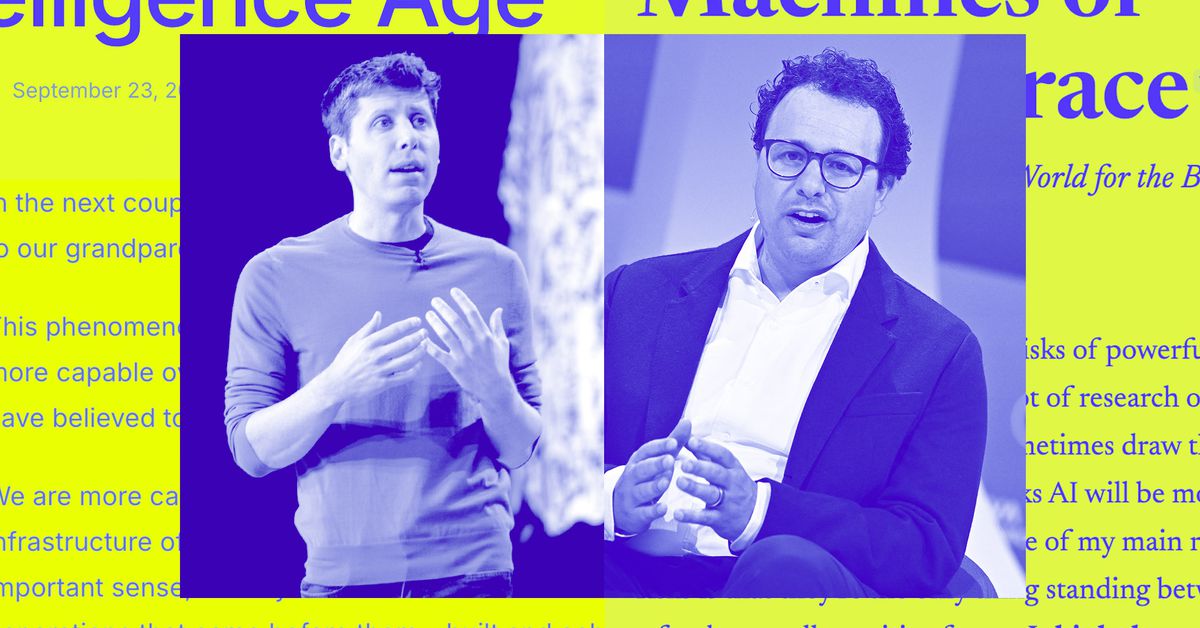The future of artificial intelligence (AI) is a topic that sparks endless debate and speculation. Will AI be a tool for humans to use like any other software, or will it become a malignant force that destroys creativity? Perhaps it will create robots bent on destruction, or maybe it will make the world incredible, beautiful, equal, and perfect in ways we can’t even begin to imagine.
The Optimistic View
Some of the men running the biggest companies in AI think it’s the latter. Both OpenAI CEO Sam Altman and Anthropic CEO Dario Amodei have recently written blog posts about the AI-powered world they hope to help create. These are powerful men with huge teams and vast resources at their disposal, and it matters a lot what they think they’re building.
Sam Altman’s blog post, The Intelligence Age, is short and to the point. He presents a vision of an AI-powered world that is filled with possibility and promise. In his view, AI will enable humans to solve some of the world’s most pressing problems, from climate change to healthcare.
A Utopian Vision
On the other hand, Dario Amodei’s blog post, Machines of Loving Grace, presents a more detailed and nuanced vision of an AI-powered future. He argues that AI has the potential to create a utopia, but warns that it will require significant investment in research and development.
According to Amodei, AI will enable humans to create machines that are capable of learning and adapting at an unprecedented scale. These machines will be able to solve complex problems, from climate change to poverty, and will ultimately lead to a world that is more equal and just.
The Challenges Ahead
While the vision presented by Amodei is certainly compelling, it also raises significant challenges. One of the biggest challenges facing AI researchers today is creating systems that are transparent, explainable, and fair. This requires significant advances in areas such as natural language processing, computer vision, and reinforcement learning.
Another challenge facing AI researchers is the issue of safety and control. As AI systems become more powerful and autonomous, there is a growing concern about their potential to cause harm. This has led to calls for greater regulation and oversight of the development of advanced AI technologies.
The Vergecast: A Discussion on AI
On this episode of The Vergecast, Kylie Robison joins the show to discuss the dueling CEO blogs, including the things Amodei and Altman agree on and the things they don’t. She also talks us through some of the big model launches left to come this year and what it means that the endless game of LLM oneupsmanship might soon be ending.
ShakeAlert: A Story of Innovation
But AI is not just about grand visions and technological advancements. It’s also about solving real-world problems, like earthquakes.
Will Poor tells us the story of ShakeAlert, an app and platform designed to alert millions of people when an earthquake is coming. If you’ve ever read that famous New Yorker article, you know why Will’s nervous about earthquakes. But it turns out we have some ways to help people – though there are some pretty surprising challenges in the way.
The Challenges of Emergency Preparedness
While ShakeAlert is a remarkable example of innovation and problem-solving, it also highlights some of the challenges facing emergency preparedness today. One of the biggest challenges is getting people to take action when faced with an earthquake warning. According to Will Poor, "it’s not just about sending out alerts – it’s about getting people to act on them."
Another challenge facing emergency preparedness is the issue of funding. As Will notes, "ShakeAlert is a publicly funded project, but there are still significant challenges in terms of maintaining the system and keeping it up-to-date."
The Camera Control Button: A Review
Finally, Allison Johnson joins Will to answer a question from the Vergecast Hotline (866-VERGE11, or email vergecast@theverge.com!) about the Camera Control button on the iPhone 16. Apple had a lot to say about how fast it is… but we had to find out for ourselves.
Resources
If you want to know more about everything we discuss in this episode, here are some links to get you started:
- Sam Altman: The Intelligence Age
- Dario Amodei: Machines of Loving Grace
- Anthropic’s CEO thinks AI will lead to a utopia — he just needs a few billion dollars first
- OpenAI plans Orion AI model release for December
- From The New Yorker: The Really Big One
- ShakeAlert
- MyShake for iOS and Android
- From Apple: How to turn on emergency and government alerts on the iPhone
- Ready.gov’s earthquake advice
We hope you enjoyed this episode of The Vergecast. If you have any questions or comments, please don’t hesitate to reach out to us at vergecast@theverge.com.
